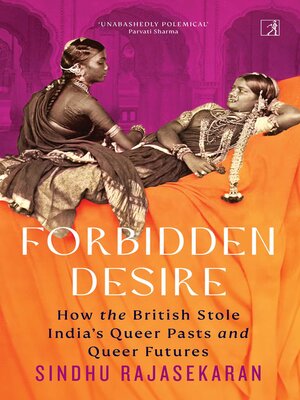Forbidden Desire
ebook ∣ How the British Stole India's Queer Pasts and Queer Futures
By Sindhu Rajasekaran

Sign up to save your library
With an OverDrive account, you can save your favorite libraries for at-a-glance information about availability. Find out more about OverDrive accounts.
Find this title in Libby, the library reading app by OverDrive.



Search for a digital library with this title
Title found at these libraries:
| Library Name | Distance |
|---|---|
| Loading... |
Before the British colonised the Indian subcontinent, it was largely protofeminist and queer.
People from across the socio-economic spectrum explored and expressed their gender and sexuality in myriad ways. But to prudish Victorian eyes, this was scandalous. The Empire consistently curtailed Indian (wo)mxn's sexual agency and the freedoms of sexual minorities. All desire outside the heteronormative was marked as aberrant and sexually unchaste.
Colonial authorities passed a posy of laws to criminalise sexually agentive (wo)mxn and queer folks. From nautch dancers to courtesans, effeminate mxn, masculine womxn, trans and queer persons, even ascetic renunciants were classified as 'sexual deviants'. Old prejudices were mapped onto new ones. Colonial India, in effect, amalgamated ancient and medieval fundamentalist codes of heteronormativity with Victorian attitudes towards sex.
Drawing from a wide range of disciplines including feminist historiography, anthropology, histories of sexuality, South Asian queer theory, decolonial and subaltern studies, the history of medicine, legislative history, and informed by the author's primary archival research, Forbidden Desire aims to undo the deleterious effects of British colonialism on India's rich queer past.
People from across the socio-economic spectrum explored and expressed their gender and sexuality in myriad ways. But to prudish Victorian eyes, this was scandalous. The Empire consistently curtailed Indian (wo)mxn's sexual agency and the freedoms of sexual minorities. All desire outside the heteronormative was marked as aberrant and sexually unchaste.
Colonial authorities passed a posy of laws to criminalise sexually agentive (wo)mxn and queer folks. From nautch dancers to courtesans, effeminate mxn, masculine womxn, trans and queer persons, even ascetic renunciants were classified as 'sexual deviants'. Old prejudices were mapped onto new ones. Colonial India, in effect, amalgamated ancient and medieval fundamentalist codes of heteronormativity with Victorian attitudes towards sex.
Drawing from a wide range of disciplines including feminist historiography, anthropology, histories of sexuality, South Asian queer theory, decolonial and subaltern studies, the history of medicine, legislative history, and informed by the author's primary archival research, Forbidden Desire aims to undo the deleterious effects of British colonialism on India's rich queer past.







